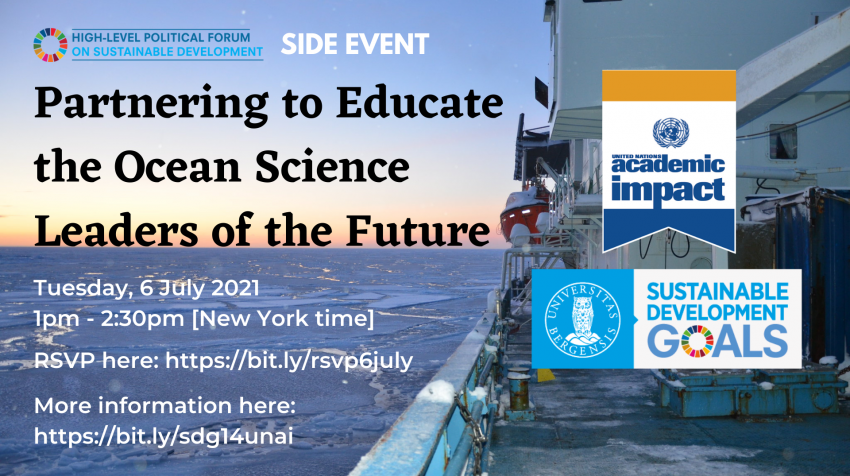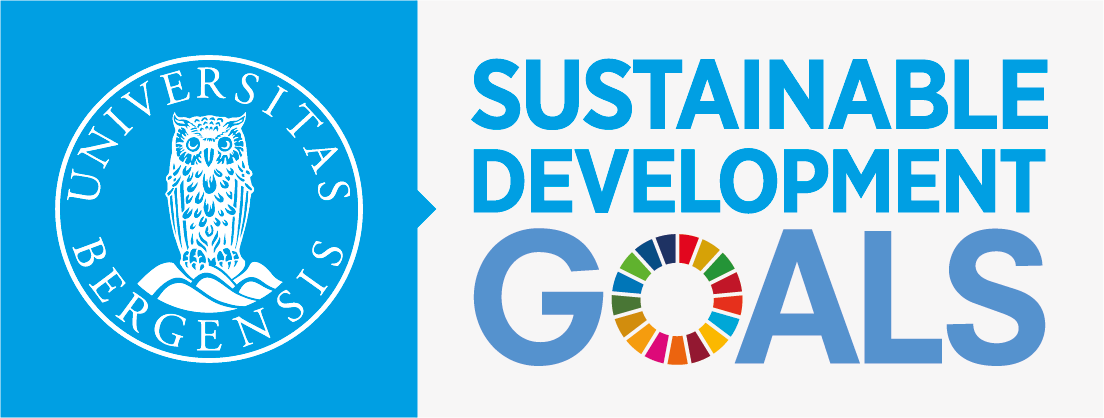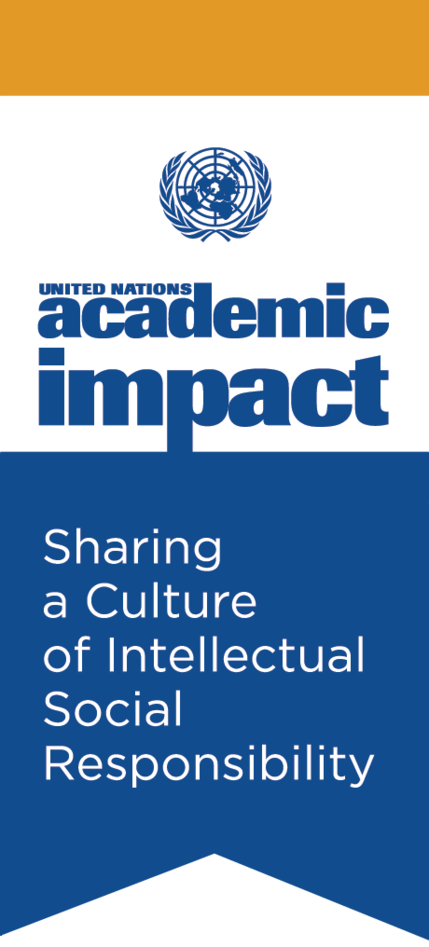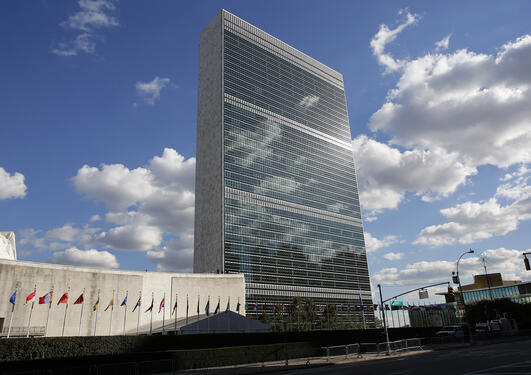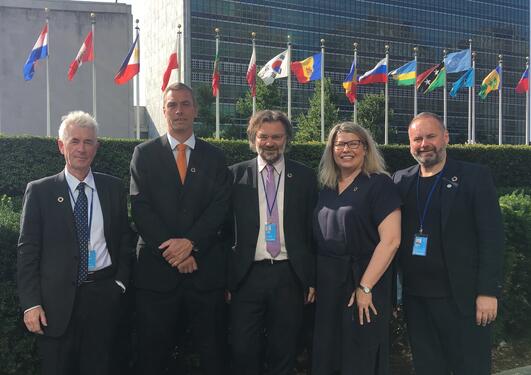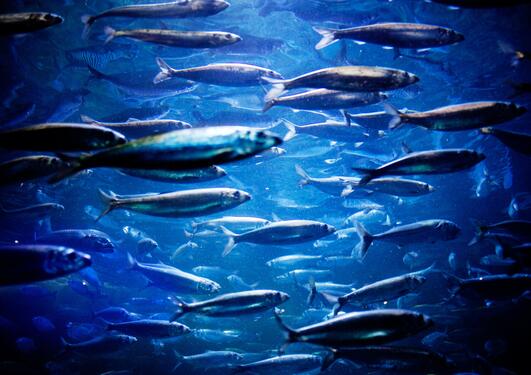Partnerships for ocean literacy
Ocean literacy took centre stage at the side event “Partnering to educate the ocean science leaders of the future” during the 2021 High-level Political Forum.

Main content
The High-level Political Forum on Sustainable Development (HLPF) takes place at the United Nations in New York every July and brings together stakeholders from politics, diplomacy, civil society, industry, unions, academia, and others to discuss the implementation of the 2030 Agenda and progress on the targets of the 17 Sustainable Development Goals (SDGs). In 2021, as well as in 2020, the HLPF has been largely digital, with mostly diplomats resident in New York being physically present at the UN.
Partnering for the ocean
On Tuesday 6 July 2021, United Nations Academic Impact (UNAI) and SDG Bergen Science Advice (SDG BSA) at the University of Bergen co-sponsored the official HLPF side event “Partnering to educate the ocean science leaders of the future”. The side event was fully digital with speakers from New York, Bergen, Longyearbyen, London, Cape Town, and Trinidad.

Public Information Officer Omar Hernández from United Nations Academic Impact opening the side event.
After a brief welcome from UNAI’s Public Information Officer Omar Hernández, Professor Edvard Hviding, who is SDG BSA’s Scientific Director, took over and guided the 200 registered participants into the upcoming discussions on how local knowledge and scientific knowledge complement each other to improve global ocean literacy, and how new approaches to higher education and researchers training are required for developing a truly interdisciplinary ocean science for the future.

Scientific Director Edvard Hviding of SDG Bergen Science Advice was the moderator of the side event. Pictured live from the studio.
The road to Lisbon
In the opening keynote Ambassador Peter Thomson, who is the UN Secretary-General’s Special Envoy for the Ocean, pointed out the voyage humankind is currently on towards the second UN Ocean Conference in Lisbon next year.
“The next UN Ocean Conference is centred on science, innovation, solutions and partnerships,” said Thomson, “with science as the flagship, powered by the renewable energy of innovation and partnerships, I am confident the solutions the conference seeks will emerge – and put us in a position to make the right decisions for the ocean.”

UN Secretary-General’s Special Envoy for the Ocean Peter Thomson gave the keynote at the side event.
He quickly turned to the theme of ocean literacy.
“When it comes to ocean literacy, we have far to go. The first principle of ocean literacy is that the world has one big ocean with many features. This is fundamental to our understanding, as it overcomes the human mindset that imagines we can carve up the ocean,” he said.
Global partnerships key to ocean literacy
He then put this into the context of global partnerships in higher education, connecting SDG14 (Life below water) and SDG17 (Partnerships for the goals).
“For us to have the science we need for the ocean we want, ocean literacy and ocean science will have to become integrated to our education systems around the world,” said Thomson, “that integration should be happening right now, from primary education to the highest tiers of our universities.”
He then mentioned two examples, in which he actively plays a part.
“I refer to the unique interdisciplinary PhD programme N-POC under which the long-term partnership of the University of the South Pacific and the University of Bergen is supporting 24 young talents to enter the critical field of the climate-ocean nexus. Last month I was happy to see this programme included in the first call of IOC-UNESCO’s Ocean Decade Action,” said Ambassador Thomson.
“And then there’s the One Ocean Expedition. An 18 month circumnavigation of the planet by the tall ship Statsraad Lehmkuhl. Along with Norway’s Prime Minister Erna Solberg I am honoured to serve as an ambassador for this sailing expedition. One of the key components of the expedition will be the interdisciplinary science and education on board. Bringing together global university partners University of the West Indies, University of Cape Town, University of the South Pacific and University of Bergen. Partnerships! Innovations! Solutions! And: Science!”
Challenges and opportunities for ocean science
An all-women panel took over after Thomson, consisting of a diverse group of innovative and entrepreneurial ocean scientists. Two from the global south, two from the global north, including an Early Career Ocean Professional (ECOP).

Moderator Edvard Hviding facing the all-women panel on screen, beaming in from all corners of the world.
In their five-minute presentations, panel members discussed a diversity of topics pertinent to the theme of the side event, including global university partnerships, inequalities in access to ocean fieldwork and research infrastructure, universities as agents of activism and advocacy, the relationships of marine sciences to traditional ocean knowledge and to the social sciences and humanities, and the challenges of pandemic lockdown, which were also identified as opportunities, in terms of the rapid rise of online communication. Underlying the four panel presentations was a shared inspiration towards reshaping human engagement with, and understandings of, the ocean.
The panel consisted of:
- Professor Lise Øvreås, Scientific Director, SDG Bergen Ocean
- Professor Isabelle Ansorge, Head of the Department of Oceanography, University of Cape Town
- Dr. Natalya Gallo, Department of Biological Sciences, University of Bergen, and UN Ocean Decade ECOP representative
- Dr. Stacy Richards-Kennedy, Director, Office of Global Partnerships and Sustainable Futures, University of the West Indies
More than 50 questions were fielded from an enthusiastic audience, which was far too many for the panel and moderator to get through during the 45 hectic minutes set aside for Q+A. A particularly moving final question came from an 8-year-old schoolgirl who wondered what she should study in order to be able to protect the ocean. Further discussions were carried on in social media during and after the event.
